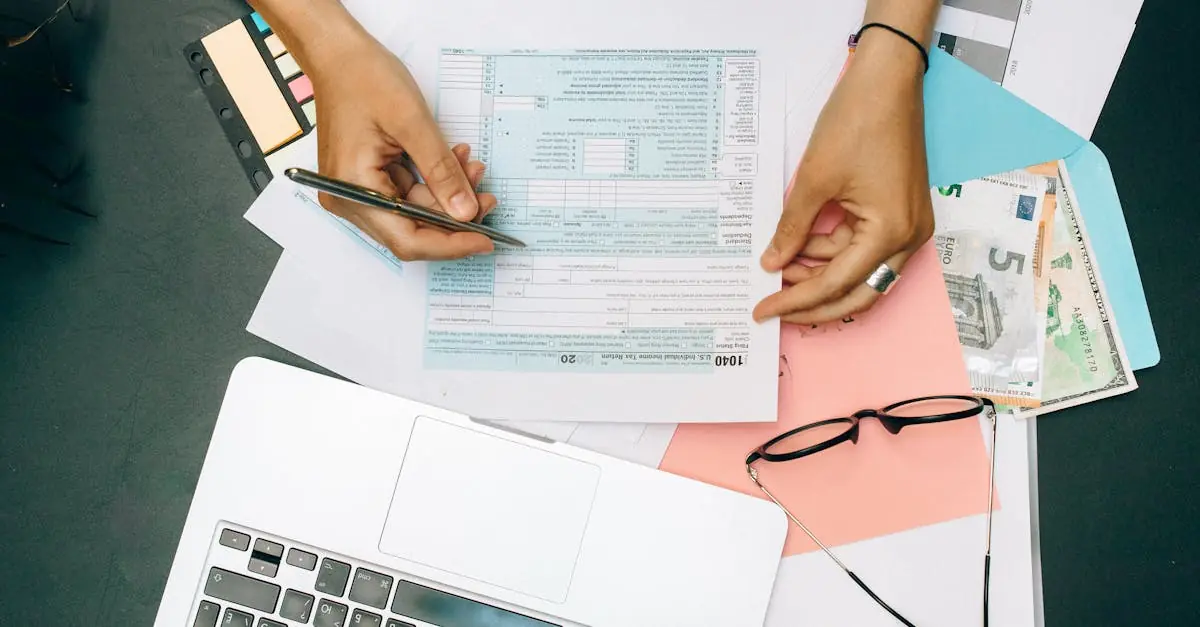Nothing strikes fear into the hearts of homeowners quite like the words “property tax audit.” It’s like the taxman’s version of a surprise party—only instead of cake and confetti, you get paperwork and stress. But fear not! A property tax audit doesn’t have to be a horror story. With the right knowledge and a sprinkle of humor, it can turn into a manageable task rather than a nightmare.
Understanding the ins and outs of property tax audits can save homeowners from unnecessary headaches and potential financial pitfalls. It’s all about knowing what to expect and how to prepare. So grab a cup of coffee, sit back, and dive into the world of property taxes, where the stakes are high, but the rewards can be even higher. After all, who wouldn’t want to keep more of their hard-earned money?
Table of Contents
ToggleUnderstanding Property Tax Audit
Property tax audits review the assessed value of real estate. These evaluations help ensure property owners pay fair taxes.
Definition of Property Tax Audit
A property tax audit occurs when local tax authorities verify the accuracy of property assessments. Property owners may face audits if discrepancies arise between reported property values and local standards. Auditors examine records to confirm property characteristics. They analyze details such as square footage, improvements, and zoning classifications. In essence, this process determines whether property taxes reflect true market value.
Importance of Property Tax Audits
Property tax audits hold significant importance for accurate revenue collection. They protect local governments by ensuring assessments align with marketplace conditions. Audits also help homeowners by identifying potential overvaluations, leading to fairer tax bills. Additionally, understanding audits can reduce anxiety associated with sudden changes in property taxes. Remaining informed allows property owners to contest inaccuracies and maintain financial stability.
Reasons for Property Tax Audits
Property tax audits occur for various reasons, primarily to ensure assessments align with market values. Understanding these reasons helps homeowners prepare effectively.
Common Triggers for Audits
Increased property values often trigger audits. When local markets experience significant growth, local tax authorities review assessments to ensure that tax revenue reflects market conditions. Errors in property descriptions can also lead to audits; discrepancies in square footage or zoning classification often highlight the need for a reevaluation. Changes in ownership or renovations frequently cause authorities to reassess a property’s value as well, sparking an audit to confirm accurate taxation. Taxpayer appeals regarding property values can prompt a more detailed review, leading to unexpected audits to verify claims.
The Role of Appraisals
Appraisals play a central role in property tax audits. They provide a professional assessment of a property’s value, which tax authorities use during audits. A well-documented appraisal can strengthen a homeowner’s position if discrepancies arise. When appraisal values differ from local assessments, it often triggers a closer look from tax authorities. Accurate appraisals ensure that homeowners pay fair taxes; outdated appraisals can result in overstated property values and higher tax bills. Local governments rely on these appraisals to maintain equity among taxpayers and ensure proper revenue collection.
Preparing for a Property Tax Audit
Preparation simplifies the property tax audit process. Understanding what documents are necessary and adopting effective practices helps property owners navigate the audit smoothly.
Documentation Needed
Essential documents play a critical role in the audit process. Property owners should gather tax returns from the previous years, including any correspondence with tax authorities. In addition, detailed property descriptions, past assessments, and current appraisal reports are crucial. Copies of receipts for improvements and renovations provide evidence of property value changes. Keeping records of property listings and comparable sales offers comprehensive market context. Lastly, any documentation relating to property disputes or appeals can significantly support a homeowner’s case.
Best Practices for Property Owners
Implementing best practices streamlines the audit experience. Familiarity with local tax laws and understanding assessment criteria enable homeowners to stay informed. Regularly reviewing property tax bills helps identify potential discrepancies early. Maintaining up-to-date records ensures easy access to important documentation during the audit process. Engaging a qualified appraiser can clarify the property’s market value and establish a strong position. Lastly, remaining cooperative with auditors and communicating openly reduces anxiety and fosters a positive interaction.
The Audit Process Explained
Understanding the audit process is crucial for homeowners facing a property tax audit. This process involves several systematic steps that ensure accuracy and fairness in property assessments.
Steps in a Property Tax Audit
Auditors begin by reviewing the property’s assessed value against local standards. They gather relevant documents, such as past tax returns and appraisal reports. Auditors then inspect property characteristics like square footage and zoning classifications. Interviews with homeowners also occur, providing them a chance to clarify any discrepancies. Finally, auditors generate a report outlining their findings and recommendations.
Potential Outcomes of an Audit
Outcomes of a property tax audit can vary widely. A common result includes a reassessed property value, which may increase or decrease taxes owed. Homeowners might receive a tax bill adjustment reflecting accurate assessments. In some cases, refunds are issued if overpayments occur. Disputes may arise if disagreements with the audit findings emerge, prompting further appeals. Understanding these outcomes helps homeowners manage expectations effectively.
Conclusion
Navigating a property tax audit doesn’t have to be overwhelming. With the right preparation and understanding of the process homeowners can approach audits with confidence. By gathering necessary documents and staying informed about local tax laws they can minimize stress and ensure fair assessments.
Maintaining open communication with auditors and seeking professional appraisals can further enhance the experience. Ultimately a proactive approach not only safeguards finances but also empowers homeowners to take charge of their property tax obligations. Embracing this process can lead to better outcomes and peace of mind.







